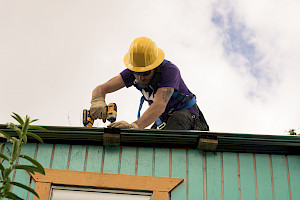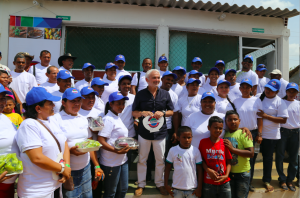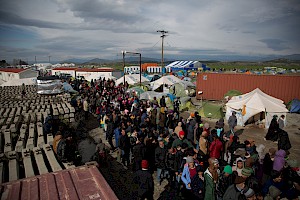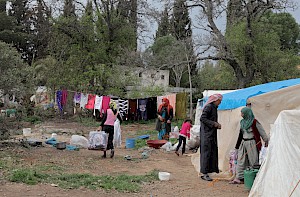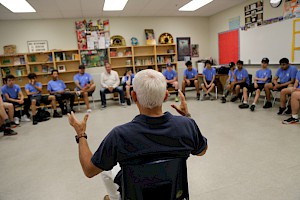The Gift of Hope
December 02, 2019On a recent dreary afternoon I found myself in a classroom facing a semi-circle of a dozen teenaged boys. As I looked into their faces, I was struck by the timing of this encounter. Just 24-hours earlier I had been on my annual trip with my own high school buddies. Ten of us get together once a year and usually go on a fishing trip. I cherish these times. They are filled with laughter and the retelling of the same old stories that become more exaggerated and are the subject of lengthy debates around what actually happened. It never gets tired. Memories are fading, so the truth may never be known. One thing I know to be true though, is that we were trouble makers. Our teenage years were pretty rough and tumble and a few of our friends didn’t make it. For many guys in my group, home life was miserable and the lack of parental involvement made getting into trouble seem unavoidable. Thankfully, we all eventually found a way to better our lives, each of us having had good careers and raising great kids. We were lucky.
The group of boys currently in front of me weren’t so lucky. They had committed some serious crimes and were now in juvenile prison. I was here to talk to them as I often do in my role as an original patron of Boys Club Network (BCN), which I have been doing for over 20 years.
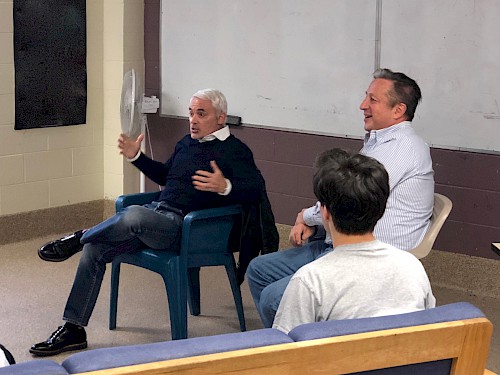 BCN tackles one of contemporary Canada’s most misunderstood and under supported social issues – that of young men aged 12-18 seeking connection. BCN identifies and lifts these lost boys up, providing them with a proven curricula of hope, opportunity, positive mentorship and education. Over the years, we have engaged hundreds of successful men and women from diverse careers, (from board rooms to film sets and the world of sport) to mentor, motivate and inspire boys from our many BCN chapters. I have 20 years of evidence that simple words of encouragement work. I have learned the thing that has matters most to them and makes the most difference is time. People giving a damn and spending time with the boys, to talk and share and empathize. To connect.
BCN tackles one of contemporary Canada’s most misunderstood and under supported social issues – that of young men aged 12-18 seeking connection. BCN identifies and lifts these lost boys up, providing them with a proven curricula of hope, opportunity, positive mentorship and education. Over the years, we have engaged hundreds of successful men and women from diverse careers, (from board rooms to film sets and the world of sport) to mentor, motivate and inspire boys from our many BCN chapters. I have 20 years of evidence that simple words of encouragement work. I have learned the thing that has matters most to them and makes the most difference is time. People giving a damn and spending time with the boys, to talk and share and empathize. To connect.
As I began my conversation, I could see from the body language of folded arms and blank stares that these boys were going to be tougher to reach than the boys I was used to mentoring, who I usually meet with in high schools rather than juvenile prison. The stakes here were higher and the price of failure was greater.
As BCN’s Walter Mustapich puts it, we’re dealing with the 1% of the 1%. The ones that truly fall through the cracks in our system. What struck me most as I learned about their individual backgrounds, was how many came from group homes. No parents or grandparents to watch over them, just a safe clean home with supervision. Sadly, it’s not enough. And although I could see that the men overseeing these boys at this particular facility truly cared, it would not be enough once they had served their time. The fact is that support ends when boys leave the system, so unless they latch on to a good friend or mentor, they are likely to end up right back where they started.
But as our conversation evolved, I could see some of the boys starting to relax. Seeing an opportunity, I suggested they ask me questions and I promised to answer anything. I was asked about my favourite books. Some of them had read “The Four Agreements” (a book that changed my life) and I encouraged all the boys to read it. I confessed that I had wasted five years of my teenage life doing negative and harmful things. I told them that one of my regrets from those years was not reading enough books. I pointed out the obvious opportunity they had - plenty of time to read. We also talked about what their passions were and what they were interested in doing as a career. I told them something I have always believed, that one can achieve anything in life if they are truly passionate about something and believed in themselves. Helping them believe in themselves is part of my job as a mentor.
As I left through the secured doors of the facility, I felt both a profound sadness for these boys and a deep appreciation for my own life. I had been luckier than those kids and I am thankful my own children were given the love and security these boys had never known. The truth is this world isn’t fair. Although these boys are serving time for good reason and need to be held accountable, they had been dealt a crappy hand to begin with. I think our conversation might have given them some hope. As we have seen time and time again, hope is the only thing that determines whether or not a young person in crisis stands a chance at recovery and a happy, productive life.
When I speak to many of my friends about my philanthropic work, some people say they don’t have enough money to give to various causes to make a difference. My response is always the same; that there are many other ways to help. Giving your time might just spark a flicker of hope and wind up changing the course of a person’s entire life.
To learn more about the Boys Club Network or make a donation go to boysclubnetwork.com

